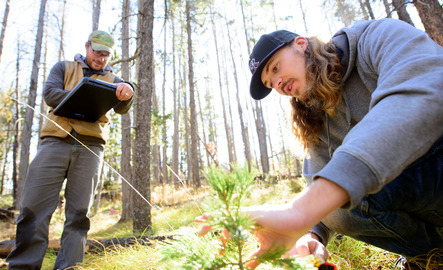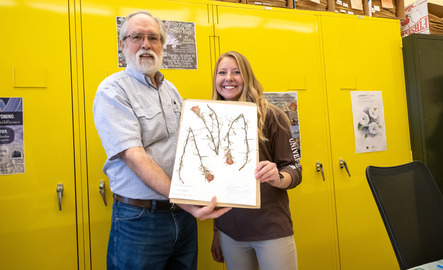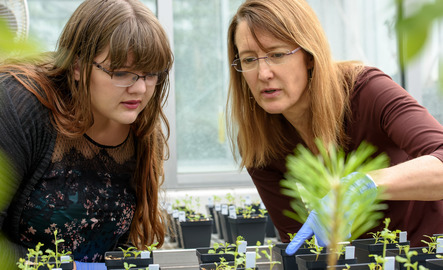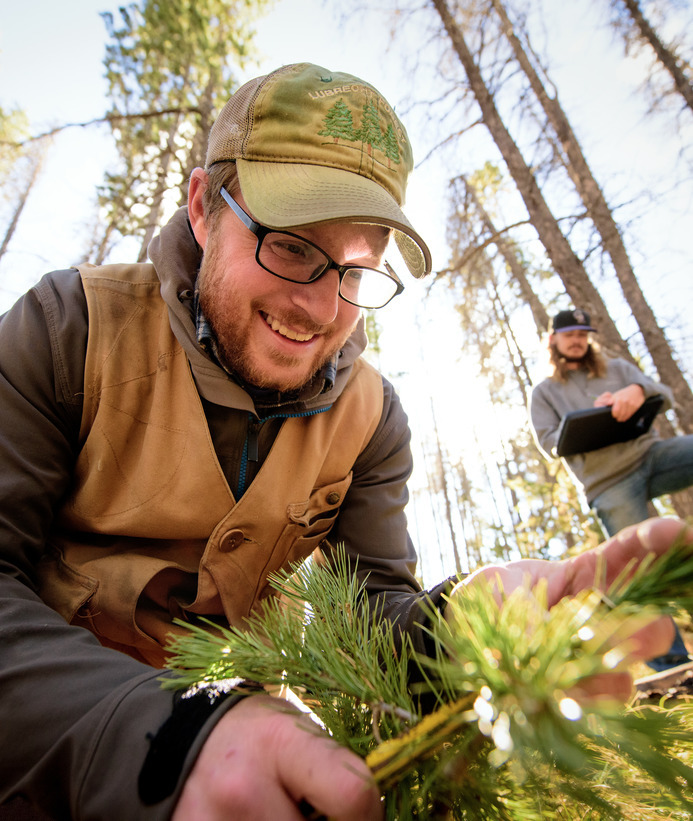About the M.S. and Ph.D. in Botany
Our doctoral and master’s in botany programs prepare students for fulfilling careers in academia, industry, government and conservation organizations. As part of the program, students may pursue specific areas of focus.
Common areas of focus for our graduate degrees include:
- Plant Physiology
- Plant Systematics and Taxonomy
- Controlled Environment Agriculture
- Ecology
- Evolutionary Biology
- Paleobotany
- Biology Education Research
Students may explore the research interests of faculty members in the department to determine the availability of specific areas of focus and identify potential advisors whose research aligns with their interests.

We are committed to preparing students for successful careers in academia, industry,
government and non-profit organizations. Through seminars, workshops and networking
events, students gain valuable professional skills such as scientific communication,
grant writing, project management and teaching pedagogy.
Students in our botany program also have access to a range of networking opportunities
and campus organizations that enrich their academic experience and foster professional
development. These opportunities include participation in academic conferences, panels,
mentorship programs, workshops and seminars.
Additionally, many of our students engage with campus organizations, such as the botany
club. The botany club organizes field trips, guest lectures and social events to promote
networking and community building.

The botany program offers various forms of financial support to eligible students, including graduate assistantships, research assistantships, teaching assistantships, fellowships, grants and scholarships. These opportunities may be funded through departmental resources, external grants or university-wide initiatives. Additionally, students have the opportunity to apply for competitive scholarships or awards specific to their field of study within botany or related disciplines.

What can you do with a botany degree?
Our graduate students are prepared for a variety of careers in academia, scientific research, teaching and plant conservation.
- Botanist
- Plant Biologist
- Taxonomist
- Ecologist
- Research Scientist
- Environmental Consultant
- Conservation Scientist
- Restoration Ecologist
- Natural Resource Manager
- Forester
- Invasive Species Specialist
- Wetland Specialist
- Nursery or Garden Center Manager
- Crop Consultant
- Agricultural Extension Officer
- Pharmaceutical Researcher
- Environmental Educator
- Seed Analyst
- Landscape Restoration Planner
- Policy Analyst
- Botanist at the Wyoming Natural Diversity Database (WYNDD)
- Dean at the Yale School of the Environment
- Paleobotanist at the National Park Service
- Staff Botanist at Golder
- Laboratory and Greenhouse Manager at the University of Wyoming
- Researcher at the University of Mexico
- Forest Monitoring Coordinator at the Colorado Forest Restoration Institute
- Natural Heritage Botanist at the Washington State Department of Natural
- Resources
- Biology Teacher and Cross Country Ski Coach at Gould Academy
- Botanist at the Bureau of Land Management
All graduate students in our botany graduate programs actively engage in hands-on research projects, contributing to the advancement of botanical science while gaining valuable skills and experience in their chosen fields. This high level of research involvement not only enriches students' academic experience but also prepares them for successful careers in various sectors, including academia, industry, government and conservation organizations.
The career outlook for botany graduates is bright, driven by the growing emphasis on green initiatives. Both public and private sectors are seeking specialists in plant science, conservation and sustainability, opening the door to a wide range of meaningful job opportunities.
“Our graduate students conduct cutting-edge research in botany, ecology, evolutionary biology, and biology education. Projects often include fieldwork, laboratory analyses, modeling, and other quantitative analyses. We have no required courses, just a minimum number of credit hours, which allows each student to work with their committee to create a program of study specifically for their needs.”
- Dr. Ellen D. Currano | Professor


